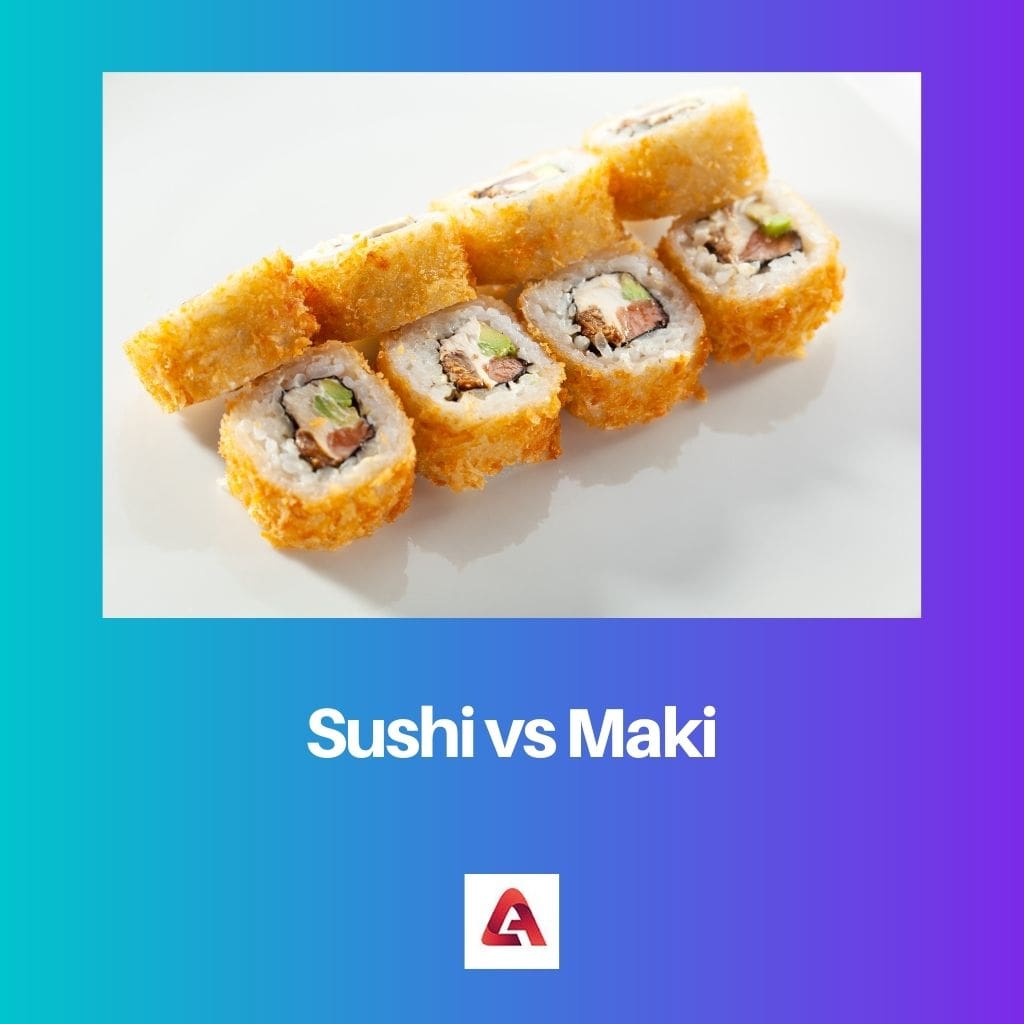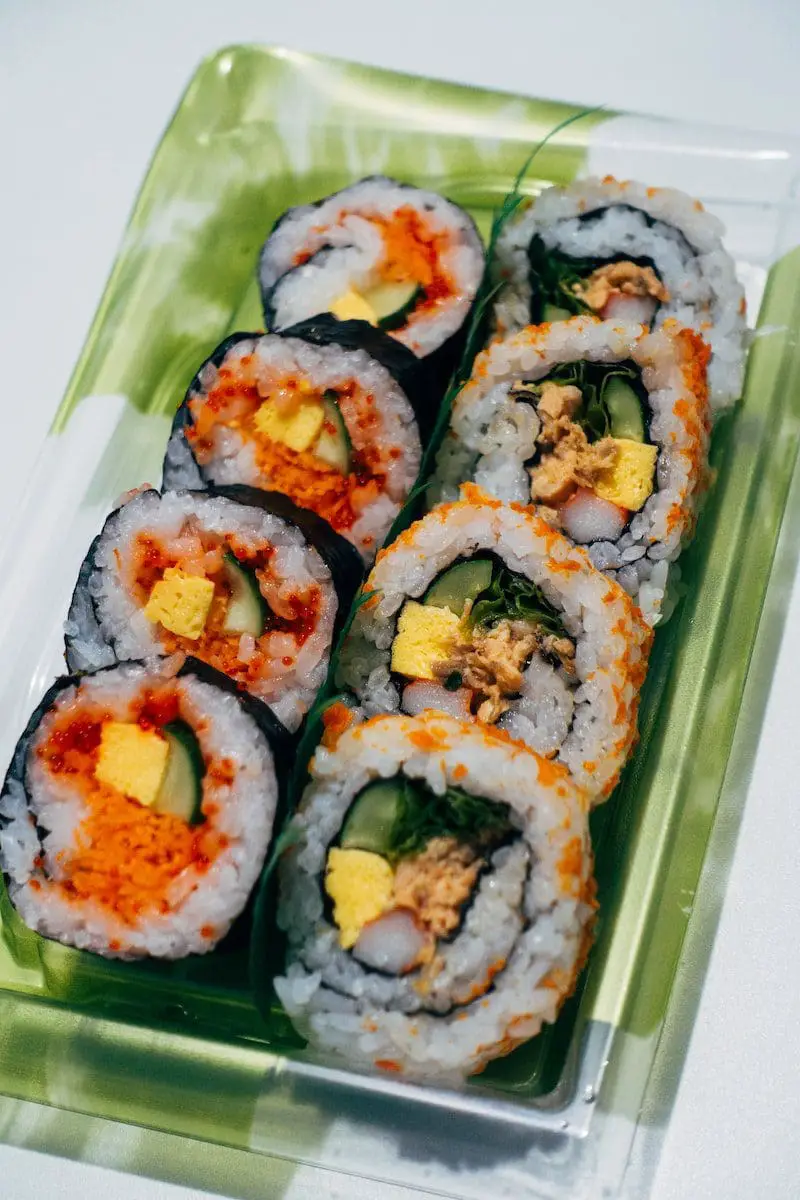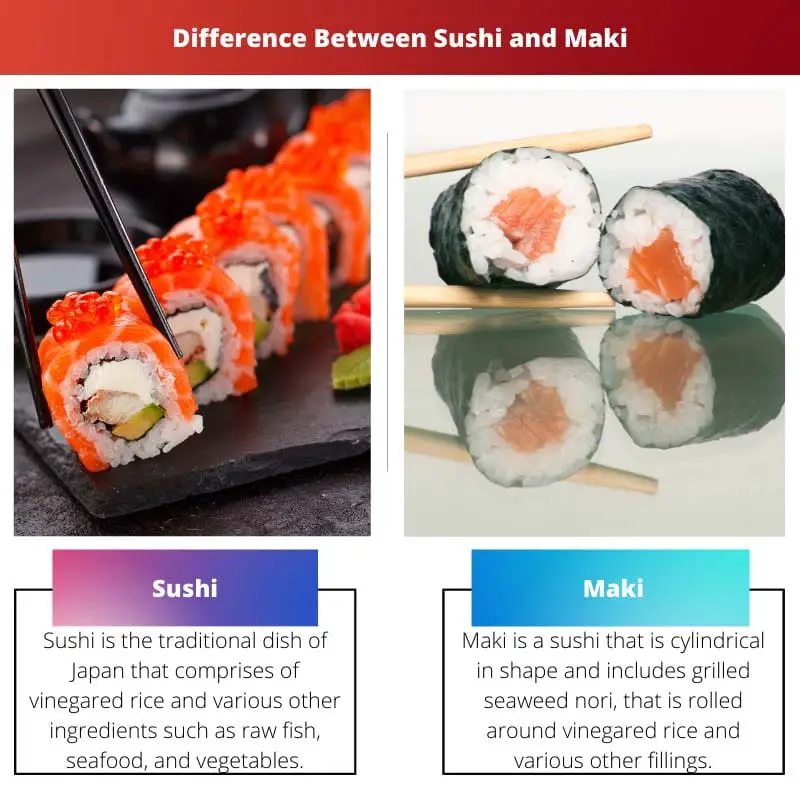Sushi and Maki have become so popular today that these Japanese dishes are found in many countries.
Key Takeaways
- Sushi is a Japanese dish consisting of vinegared rice and other ingredients, such as raw fish, cooked seafood, vegetables, or tropical fruits.
- Maki, also known as makizushi, is a specific type of sushi rolled in nori (seaweed) with vinegared rice and various fillings like fish, vegetables, or avocado and then sliced into bite-sized pieces.
- Both sushi and maki are Japanese dishes that involve vinegared rice. Still, sushi encompasses a broader range of preparations, while maki specifically refers to sushi rolls wrapped in nori and filled with various ingredients.
Sushi vs Maki
The difference between Maki and Sushi is their shape. Maki is a circular variety of Sushi, while Sushi can come in varying shapes. Sushi and Maki are the traditional dishes of Japan, and one cannot miss them while talking about Japanese dishes.

Sushi is a Japanese dish comprising vinegared rice and other ingredients such as raw fish, seafood, and vegetables. Sushi consists of a base of rice accompanied by other ingredients.
Here sushi refers to rice and not fish. Shari and Neta are the two parts that Sushi is made up of.
The cooked rice refers to Shari, whereas the other ingredients refer to Neta.
Maki is a variety of sushi that is rolled up in nori. It is cylindrical and includes grilled seaweed nori rolled around vinegared rice and various other fillings.
Comparison Table
| Parameter of Comparison | Sushi | Maki |
|---|---|---|
| Definition | Sushi is a traditional dish in Japan that comprises vinegared rice and various other ingredients such as raw fish, seafood, and vegetables. | Maki is a cylindrical sushi that includes grilled seaweed nori, which is rolled around vinegared rice and various other fillings. |
| Shape | Sushi can have varying shapes. | Maki is round. |
| Ingredients | Sushi comprises flavoured vinegar rice and other ingredients such as raw fish, vegetables and seafood. | Maki comprises sushi rice, fillings and the seaweed mat (nori). |
| Types | The different types of sushi include: Oshi Zushi (pressed sushi), Nigiri Zushi (hand-shaped sushi), Chirashi Zushi (scattered sushi) and Maki Zushi (rolled sushi) | The different types of maki include: hosomaki (thin rolls), uramaki (inside-out roll), futomaki (thick, large or fat rolls) and temaki (hand roll) |
| Presentation | Sushi can be served in many ways based on the sushi style, but the primary rule of presentation is simplicity. | Maki is served in cylindrical rolls that show layers of fish, vegetables, rice, and seaweed. |
What is Sushi?
Sushi is vinegar-flavoured rice accompanied by seafood, vegetables, raw fish and other ingredients. The preparation and the ingredients of the sushi may differ significantly, but the primary ingredient is rice, which all sushi has in usual.
White as well as brown rice can be used in Sushi. It is mainly served with various seasonings such as Wasabi, pickled ginger and soy sauce.
Sushi includes an extensive range of dishes, and some common sushi types are given below:
- Chirashizushi bowl of vine-flavoured rice coated with sashimi and other seasonings.
- Narezushi is another variety of sushi. Rice is set out with peeled, cleaned fish brewed for six months with salt.
- Inarizushi is a type of sushi made by stuffing sushi rice into a container of tofu and then frying it.
- Makizushi is a variety of sushi that is prepared by placing the sushi rice and the other ingredients in seaweed and rolling them.

What is Maki?
Maki is a variety of sushi. It can also be known as rolled sushi. Its shape is cylindrical.
There are layers of cooked or raw fish, vinegared rice and vegetables put on a seaweed sheet and then rolled into a cylinder. After that, several pieces are cut off.
This stuffing can also be shrouded in soy paper, a thin omelette, or a cucumber. Maki can be categorised based on the roll’s stuffing and thickness.
Some of these types are given below:
- Futomaki is a type of maki, a large cylindrical piece 2 inches in diameter. It is vegetarian and can have two or more ingredients in the stuffing.
- Hosomaki is another type of maki, a small cylindrical piece with a 1-inch diameter. Its main stuffing comprises only one ingredient.
- Temaki is a big piece which is cone-shaped, stuffed with different ingredients and is meant to be consumed with hands.
- Uramaki is an inside-out roll; it is a medium-sized cylindrical piece. Here the rice is outside the roll. It is mainly eaten outside of Japan.

Main Differences Between Sushi and Maki
- Sushi is a Japanese dish made from rice. Maki is nothing but a variety of sushi that is also known as rolled sushi.
- Maki is prepared almost the same way as sushi, but the only difference is that Maki is made by folding the composition in nori.
- Sushi includes many dishes; Nigiri and Maki are the most common. Maki is a variety of sushi consisting of grilled seaweed nori rolled around flavoured vinegar rice and different stuffings.
- Sushi can be served in many ways, whereas Maki is served in rolls.
- The different types of sushi include pressed, hand-shaped, scattered, and rolled sushi.
- The different types of maki include thin rolls, inside-out rolls, thick, large or fat rolls and hand rolls.

- https://meridian.allenpress.com/jfp/article-abstract/71/4/860/171883
- https://images.buch.de/images-adb/ba/8b/ba8b6026-9d25-481c-a765-42ae241f3f87.pdf